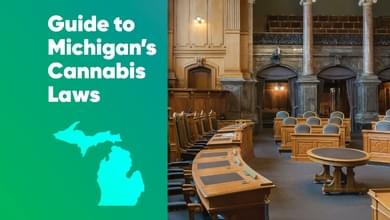
Guide to Michigan's Cannabis Laws
Published on 2/3/23
Michigan's place in the cannabis landscape is relatively new given that the state only legalized medicinal cannabis in 2008, then recreational cannabis a decade later, by which point over a dozen other states had made recreational pot legal. Nevertheless, the size of the state (the 10th largest in the nation) and the scope of the growing scene (only a handful of states have more farmland per capita) make it an intriguing piece of the national conversation. What is the state of Michigan's cannabis laws?
From Here To There
While cannabis remains stubbornly illegal at the federal level despite some progress, many states have taken the initiative to relax their laws. While Michigan lagged behind many other states in legalizing medicinal cannabis (the 14th to do so), they did so sooner than any neighbors. What's more, the Michigan cannabis laws of 2018 ushered in legalized recreational weed, making it the first state in the Midwest to do so under the Michigan Regulation and Taxation of Marijuana Act. This not only applies to flower but also infused substances, making it a Michigan edibles bill.
The State of Michigan Pot Today
Unlike some states that offer unique options for cannabis consumption, Michigan law states that cannabis use (both recreational and medicinal) must take place within a private home: it is illegal for any use of cannabis in a public space, as well as illegal in government buildings, airports, or other public facilities. It is also illegal to carry cannabis into areas where children are present, like schools, parks, or public transportation. Michigan employers are not required to accommodate either medicinal or recreational cannabis, meaning that an employee can be fired if they either are stoned at work or if they pop a positive drug test. Having a valid medical card, or using cannabis off duty, does not prevent a person from potentially losing their job.
Michigan's law has set it up so that only licensed dispensaries can sell cannabis (medicinal or recreational). Medicinal dispensaries must get approval from the Michigan Medical Marihuana Licensing Board (the state government specifically spells it this way), while dispensaries must go through rigorous regulations before they can open their doors. Can anyone buy from a dispensary in Michigan? There are several restrictions: medicinal patients must have a valid ID card, while recreational customers must be 21 years old or over and have a valid driver's license.
Growing Strong
Michigan's extensive growing operations long pre-date the legalization of both medicinal and recreational cannabis, given the strong growing season, plentitude of water, and excellent soil conditions throughout the state. Michigan's cannabis laws permit people 21 years of age or older to grow up to 12 cannabis plants within their residence. However, there are many restrictions on this law. Plants must be in an enclosed area that the public cannot access (e.g., no plants on balconies). Plants cannot be visible from outside your property. Finally, the growing area must be locked so that only the property owner can access them.
Rental properties are not required to follow this law, and it is legal for them to evict tenants who grow their own cannabis. While it is legal to grow cannabis in a rental property, anyone hoping to do so should check in with the property owner before doing so, lest they find themselves looking at an eviction notice or even criminal charges.
Outdoor cultivation is legal but also follows the same laws as indoor cultivation. The plants cannot be visible from the outside of the property when viewed at ground level or from another building. Additionally, outdoor grows require a secure enclosure, like a chain-link fence anchored to the ground. Outdoor cultivation is only allowed in areas where the person either owns or rents the property. Finally, the owner must lock or otherwise secure the growing site to restrict access. While outdoor growing is legal, all drying, trimming, and curing of cannabis plants must take place indoors.
Penalties
Any law comes with penalties, and the penalties for some cannabis use can be severe. Luckily, the law is very lenient when it comes to personal use. There are no felony charges for first offenses of possession (except within 1000 yards of a school or park), and possession of up to 5 ounces as a first offense is a civil infraction with a fine of $500. Possession of more than 5 ounces is a misdemeanor but carries no jail time.
The sale and distribution of cannabis without a proper license is much stricter; however, while there is no penalty or fine for distribution of fewer than 2.5 ounces, distributing more than 5 ounces carries a fine of $500. Sales of up to 5kg (11 pounds) is a felon, with four years incarceration or a fine of $20,000, while sales of 45kg or more can be a felony with 7 to 15 years incarceration, plus fines ranging from $500,000 to an eye-watering ten million dollars.
Penalties for cultivation are not nearly as strict. Possessing up to 24 plants is a civil infraction with a $500 fine, while possession of more plants is a misdemeanor that can result in possible jail time and higher fines.


















